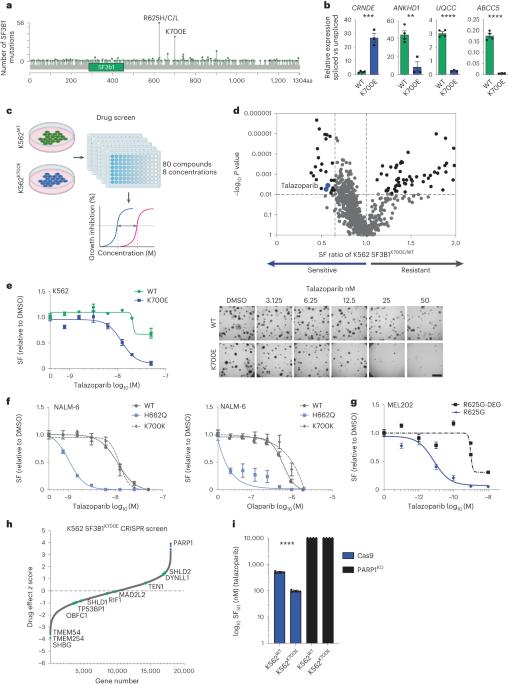SF3B1 热点突变会引起复制应激反应缺陷,从而对 PARP 抑制产生敏感性
IF 31.7
1区 生物学
Q1 GENETICS & HEREDITY
引用次数: 1
摘要
SF3B1 热点突变与几种肿瘤类型的不良预后有关,并导致典型剪接的全面中断。通过合成致死药物筛选,我们发现SF3B1突变体(SF3B1MUT)细胞对多(ADP-核糖)聚合酶抑制剂(PARPi)选择性敏感,与热点突变和肿瘤部位无关。SF3B1MUT 细胞对 PARPi 诱导的复制应激反应有缺陷,这种应激反应是通过下调细胞周期蛋白依赖性激酶 2 交互蛋白(CINP)发生的,导致复制叉起源点火增加和磷酸化 CHK1(pCHK1; S317)诱导丧失。这导致随后无法解决 DNA 复制中间产物和 G2/M 细胞周期停滞。这些缺陷可通过 CINP 的过表达得到挽救,或通过结合共济失调-特朗吉赛突变和 PARP 抑制来进一步靶向治疗。在体内,PARPi 能在多种 SF3B1MUT 癌症模型中产生深远的抗肿瘤效果,并能消除远处转移。这些数据为在生物标志物驱动、同源重组熟练的患者群体中测试 PARPi 的临床疗效提供了依据。SF3B1突变会使患者对多(ADP-核糖)聚合酶抑制剂(PARPi)产生敏感性。从机理上讲,这与同源重组修复无关,而是依赖于细胞周期蛋白依赖性激酶 2 交互蛋白(CINP)减少导致的复制应激反应缺陷。PARPi处理SF3B1突变体(SF3B1MUT)肿瘤会导致叉源点火增加而诱发复制应激反应,最终导致细胞周期停滞。本文章由计算机程序翻译,如有差异,请以英文原文为准。

SF3B1 hotspot mutations confer sensitivity to PARP inhibition by eliciting a defective replication stress response
SF3B1 hotspot mutations are associated with a poor prognosis in several tumor types and lead to global disruption of canonical splicing. Through synthetic lethal drug screens, we identify that SF3B1 mutant (SF3B1MUT) cells are selectively sensitive to poly (ADP-ribose) polymerase inhibitors (PARPi), independent of hotspot mutation and tumor site. SF3B1MUT cells display a defective response to PARPi-induced replication stress that occurs via downregulation of the cyclin-dependent kinase 2 interacting protein (CINP), leading to increased replication fork origin firing and loss of phosphorylated CHK1 (pCHK1; S317) induction. This results in subsequent failure to resolve DNA replication intermediates and G2/M cell cycle arrest. These defects are rescued through CINP overexpression, or further targeted by a combination of ataxia-telangiectasia mutated and PARP inhibition. In vivo, PARPi produce profound antitumor effects in multiple SF3B1MUT cancer models and eliminate distant metastases. These data provide the rationale for testing the clinical efficacy of PARPi in a biomarker-driven, homologous recombination proficient, patient population. SF3B1 mutations confer sensitivity to poly (ADP-ribose) polymerase inhibitors (PARPi). Mechanistically, this is independent of homologous recombination repair and instead relies on a defective replication stress response due to a reduction of the cyclin-dependent kinase 2 interacting protein (CINP). PARPi treatment of SF3B1 mutant (SF3B1MUT) tumors leads to replication stress induced by increased fork origin firing and culminates in cell cycle stalling.
求助全文
通过发布文献求助,成功后即可免费获取论文全文。
去求助
来源期刊

Nature genetics
生物-遗传学
CiteScore
43.00
自引率
2.60%
发文量
241
审稿时长
3 months
期刊介绍:
Nature Genetics publishes the very highest quality research in genetics. It encompasses genetic and functional genomic studies on human and plant traits and on other model organisms. Current emphasis is on the genetic basis for common and complex diseases and on the functional mechanism, architecture and evolution of gene networks, studied by experimental perturbation.
Integrative genetic topics comprise, but are not limited to:
-Genes in the pathology of human disease
-Molecular analysis of simple and complex genetic traits
-Cancer genetics
-Agricultural genomics
-Developmental genetics
-Regulatory variation in gene expression
-Strategies and technologies for extracting function from genomic data
-Pharmacological genomics
-Genome evolution
 求助内容:
求助内容: 应助结果提醒方式:
应助结果提醒方式:


